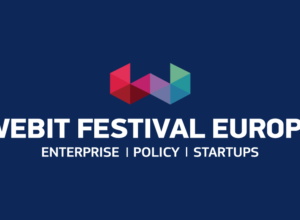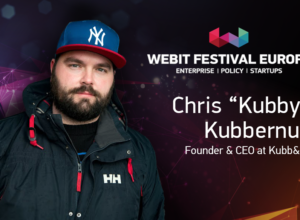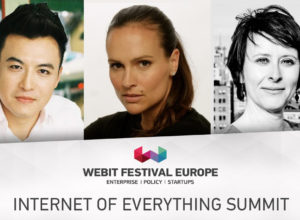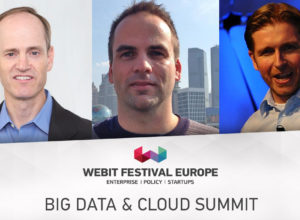Tag: Data
We’ve updated our Privacy Statement
There is so much buzz around the new EU’s General Data Protection Regulation (GDPR)
At Webit we are firmly committed to privacy and data protection and we are happy to confirm that we, too, have taken all necessary steps to ensure [full] compliance with the GDPR. All necessary controls and features are in place so you can continue to use our service with confidence.
Feel free to check out our updated Privacy Statement to understand more about the types of information we may collect, how we use it, and why we request it.
Webit is all about community and empowering your success through connecting you with potential partners, investors and clients from all around the world.
SPECIAL 50% DISCOUNT
We also want to take this opportunity to let you know that Webit is welcoming this new era of data privacy by providing all our subscribers a special "DATA present” 50% off from all tickets for Webit.Fetsival Europe 2018 starting this Friday, 25 May till 29 May.
We release a total of 250 tickets for this special "DATA Present".
Register here
and join Webit.Festival Europe with a special discount of 50% on all tickets with code: GDPR
We collect personal data when you register with us via our website or when participating in our events, exchange personal contacts, etc. We will use your personal information to provide and further improve our services, to ensure the security of our website and information systems, as well as for fraud prevention. We do not share it with other companies or organizations. We send to our customers, partners, participants in our events, subscribers and community our information bulletin about the upcoming events, promotions and free tickets, latest developments, new technologies, meetups, parties, products and services, etc.
Investments in FinTech
FinTech is data
Money is data too, they represent the value. As we’ve already entered a “data age”, there’s much more consciousness about the data. From online payments through digital wallets and asset management, this is a pretty vast area of settling a company and acquiring a market segment of. As for FinTech where the area has been controlled by the big banks and large organizations until recently, now we see more and more startups creating new products and truly having an impact. Even though it’s getting more crowded in the last few years, this market still provides probably the biggest opportunity that’s out there in terms of a market.One of the advantages of investing in FinTech is that one always knows where the money come from
By default, FinTech companies are dealing with money so that makes an investor’s job easier in order to track the flows. This area is fairly straightforward when it comes to a particular business model and the way the business works. The market for financial services is more than enough large so nobody has to ask questions about the size of the market or how companies in the sector will make money. The question is whether they can execute and succeed. The buzz in FInTech naturally raises the question of security: security solutions and their integration in FinTech products and services. Companies are putting more and more information on the cloud so security is a sensitive issue in all areas and needs to be paid proper attention to. Companies operating in this domain need to deal with regulations, licences and still find a way to keep their customers data secure.Webit.Festival Europe 2018 presents: Chris ‘Kubby’ Kubbernus
Here you can see a full list of the confirmed speakers at Webit.Festival, while here you can get all the information you need about the tickets for the event.
We need to go back to good, credible and authentic storytelling that brings value to the consumer
The notion of change is essential in the 21st century. We are developing way faster than we thought we would in 2008, for example. We now consider diseases treatable, in comparison with just 10 years back; companies have to adapt to change, but this would be impossible without certain people - people who envision the future, who encompass change and apply it. Chris Kubbernus, or Kubby, as his friends call him, named #1 Business Guru on Snapchat by Forbes, will be among the speakers at Webit.Innovate! Summit at the next Webit.Festival Europe 2018 on 26th - 27th June 2018. The one thing Chris wishes people to remember out of his talk would be that things change. According to him, companies today are not using technologies to their fullest potential - not seeing what’s happening in the marketplace and cannot react adequately.“ If you say to an organization: 'I think you should use Snapchat, or get on Instagram', they’d roll their eyes and say: 'Why would we do that?’ What they don’t realize is that these things quickly become mainstream, and that’s where they’re losing. They’re actually ignoring what’s going on in the marketplace, thinking that it’s just a trend and therefore not doing anything about it. Change happens and organizations have to recognize that and act on it before it gets too expensive.”
Chris is originally from Canada, but he likes to say that he was “imported in Denmark” by his wife. The difference in the two continents is obvious, in terms of marketing, but what exactly Chris finds drastically different is:Americans and Canadians are more trusting in their advertising. If you make a claim, they might take that as face value, whereas I think with Europeans, you have to have a more soft approach.
Living in Northern Europe, Scandinavians, he continues have a different approach to advertisement. People there are more likely to doubt the quality of the product whereas the Americans would trust the ad and will expect the same results.In social media, I find that Europeans are more conservative. They are less likely to share and like something or to engage with content. I think it takes a lot to move them to action, where in North America, in particular, it seems to be easier. People are more relaxed towards sharing on social media and voicing their opinions.
Chris was a speaker at the first Snapchat conference - we saw the rise of Snapchat, we all know those Snapchat glasses, don’t we. We are now also seeing the fall of Snapchat as a platform, it doesn't attract so much audience, in fact, its users are youngsters. It just somehow feels Snapchat will not last much longer, although, Chris says, you have to wonder why the biggest social networks in the world are mimicking what Snapchat did.“ I think, in a way, Snapchat is being replaced by Instagram. Instagram is doing a very good job of copying and making their own new features. But Snapchat is a playground, still much more than Instagram. And Facebook sees that they are losing the younger generation, so I think that if Snapchat can continue being the anti-Facebook, they will stay relevant. They just need to retain that identity. “
Besides Facebook, another huge platform is so very widely used - Instagram. The main differences in the two platforms, Chris explains like this:On Facebook, content is consumed slower and with more thought. People are less likely to like on Facebook, whereas on Instagram, there’s less exposure and more anonymity. Instagram is a little hedonistic in some ways, while Facebook is your core of friends and family, where you have to be more ‘considerate'.
Unlike some other social platforms, like Snapchat, for example, Facebook will be present in our lives for many more years. It is a place where you can document your entire life and in terms of ‘replacing’, Instagram will not replace Facebook as a social media platform. At the end of the day, “both platforms are playgrounds for displaying different parts of our personalities”. My social media predictions for 2018 is a continuation and examination of influencer-marketing and how much we let social media influence us, says Kubby. The psychological effect of social media will continue to determine the way we communicate and perceive information and the trend of what is real and what is fake will determine the consumer’s behaviour.“ Right now, digital marketing is losing consumers because of disinterest and mistrust in fake influencer-marketing. We need to go back to good, credible and authentic storytelling that brings value to the consumer. “
M&A as a Fuel to Innovation
Sriram Prakash, the Global Lead for Innovation M&A and Venturing Services at Deloitte was one of the speakers at Webit.Festival Investments Summit who shared his insight about fueling growth through innovation M&A.
Living in an economy of expectations
An innovation can come from anywhere.It can come from a small unknown town in India, it can come from a booming city like New York, it can come from anywhere. If you want to turn your innovation into a billion dollar business though, you need some extra things than the idea itself. You need an ecosystem, you need entrepreneurs and corporates, you need the governments and different policy makers. And in fact, there are very few cities and ecosystems allowing you to do that but this doesn’t mean that your ideas can’t travel. Ideas have no boundaries anymore and that’s become quite an advantage for all market players. Markets are full of uncertainty today, they are getting saturated and there’s a backlash against globalization. For the past three years revenue growth rates has been on the decline but the share price are on the rise. That’s why innovation has become such a strong priority for companies to grow. Mergers & acquisitions is one of the ways for companies to tap into innovations happening outside of their private ecosystem rather than trying to focus on purely growing organically.More and more non-technological companies are investing in and acquiring tech companies
This means that a nowadays startup has the option of not just one but more exits and more than one sectors that could be interested in its particular innovation. The process is not one-way only. It’s not only old companies trying to go into digital. Startup companies are also buying some old style companies depending on their needs. Most of the disruptors under the scope of corporates are AI, Robotics, Big Data, Analytics and IoT, finally coming to a stage where the commercial potential can be realised. Venture capital & investment companies trying to get their way through the field should be better in the way of trying to find what people want rather than trying to invent the next Facebook or Uber. The biggest battle is for the future of consumers and the consumer industry as changing as it is. Companies of different sectors are merging and acquiring others out of their area of business and specialization. We see healthcare industry mixing with Fintech, IoT with Data and all together. For the first time there’s a genuine convergence between non-traditional sectors converging around a particular opportunity.Blockchain technology gives patients real-time access to their personal data
“Data can be a powerful force for social progress, helping our most important institutions to improve how they serve their communities. As cities, hospitals and transport systems find new ways to understand what people need from them, they’re unearthing opportunities to change how they work today and identifying existing ideas for the future”, the company’s Co-founder Mustafa Suleyman wrote in a blog post.It is working in partnership with London’s Royal Free Hospital to develop kidney monitoring software called Streams, but critics still feel that data sharing can give Google too much power over the National Health System. According to Suleyman, data can only benefit society if it has society’s trust and confidence and that is the reason why auditability becomes an increasingly important virtue. He explained that any entry will record the fact that a particular piece of data has been used and also the reason why, for example a blood test was checked against the NHS national algorithm to detect possible acute kidney injury. The new systems are related to the bitcoin cryptocurrency and just like blockchain, the ledger will be append-only, so once a record of data use is added, it can’t be erased later. The ledger will also make it possible for third parties to verify that nobody has tampered with any of the entries. Meanwhile, Google announced a series of new tools to assist users with data preparation and integration, which will upgrade the power and agility of Google Cloud for business clients. The first released product is the new private beta of Google Cloud Dataprep. The tool is visualizing the data preparation, detecting anomalies and using machine learning to suggest data transformation that can improve the quality of information. To learn more about the latest trends in FinTech & Blockchain, Health Tech and Big Data & Cloud visit Webit.Festival Europe in Sofia on April 25 and 26. During the event you can listen to top level speakers, such as the Vice President for Cloud and Mobile Technology Strategy at IBM Jonas Jacobi, the Global Head of FinTech at ING Group Benoit Legrand and the Consultant Surgeon and Co-founder of Virtual Medics and Medical Realities Prof. Shafi Ahmed.








